Language acquistion c - Study guides, Class notes & Summaries
Looking for the best study guides, study notes and summaries about Language acquistion c? On this page you'll find 21 study documents about Language acquistion c.
Page 2 out of 21 results
Sort by
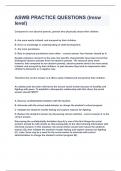
-
ASWB PRACTICE QUESTIONS (lmsw level)|2023 LATEST UPDATE|GUARANTEED SUCCESS
- Exam (elaborations) • 15 pages • 2023
-
Available in package deal
-
- $14.49
- + learn more
Compared to non abusive parents, parents who physically abuse their children A. Are more easily irritated, and annoyed by their children. B. Have no knowledge or understanding of child development. C. Are more permissive. D. Rely on physical punishment more often. Your Answer should be A. Despite extensive research in the area, few specific characteristic have been found that distinguish abusive parents from non-abusive parents. The research does show however, that compared to non abusiv...
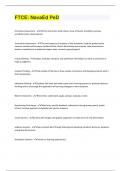
-
FTCE: NavaEd PeD | Questions with 100 % correct Answers | Verified
- Exam (elaborations) • 24 pages • 2023
-
- $7.99
- + learn more
FTCE: NavaEd PeD Formative Assessment - Informs instruction (exit tickets, show of hands, checklists, journals, anecdotal notes, observations) Summative Assessment - The end measure of mastery of the standards. Used for grades and to measure teacher performance (midterm/final, district benchmark assessments, state assessments, teacher created tests or textbook chapter tests, research paper/project). critical thinking - Analyze, evaluate, interpret, and synthesize information to reach a con...
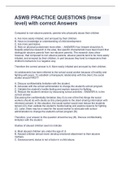
-
ASWB PRACTICE QUESTIONS (lmsw level) with correct Answers
- Exam (elaborations) • 12 pages • 2023
-
Available in package deal
-
- $10.39
- + learn more
Compared to non-abusive parents, parents who physically abuse their children A. Are more easily irritated, and annoyed by their children. B. Have no knowledge or understanding of child development. C. Are more permissive. D. Rely on physical punishment more often. - ANSWER-Your Answer should be A. Despite extensive research in the area, few specific characteristic have been found that distinguish abusive parents from non-abusive parents. The research does show however, that compared to n...
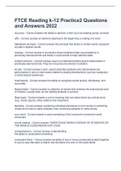
-
FTCE Reading k-12 Practice2 Questions and Answers 2022
- Exam (elaborations) • 15 pages • 2022
-
Available in package deal
-
- $10.99
- + learn more
accuracy - Correct answer-the ability to perform a skill, such as reading words, correctly affix - Correct answer-an element attached to the beginning or ending of a word Alphabetic principle - Correct answer-the principle that letters in written words represent sounds in spoken words analogy - Correct answer-a connection drawn between letter-sound patterns in previously learned words and those in novel words to help read the latter. Analytic phonics - Correct answer-Learn to understand le...
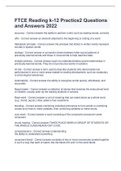
-
FTCE Reading k-12 Practice2 Questions and Answers 2022
- Exam (elaborations) • 15 pages • 2022
-
Available in package deal
-
- $10.99
- + learn more
accuracy - Correct answer-the ability to perform a skill, such as reading words, correctly affix - Correct answer-an element attached to the beginning or ending of a word Alphabetic principle - Correct answer-the principle that letters in written words represent sounds in spoken words analogy - Correct answer-a connection drawn between letter-sound patterns in previously learned words and those in novel words to help read the latter. Analytic phonics - Correct answer-Learn to understand le...
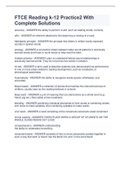
-
FTCE Reading k-12 Practice2 With Complete Solutions 2022
- Summary • 14 pages • 2022
-
- $7.39
- + learn more
accuracy - ANSWER-the ability to perform a skill, such as reading words, correctly affix - ANSWER-an element attached to the beginning or ending of a word Alphabetic principle - ANSWER-the principle that letters in written words represent sounds in spoken words analogy - ANSWER-a connection drawn between letter-sound patterns in previously learned words and those in novel words to help read the latter. Analytic phonics - ANSWER-Learn to understand letters-sound relationships in previously...
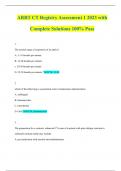
-
ARRT CT Registry Assessment 1 2023 with Complete Solutions 100% Pass
- Exam (elaborations) • 63 pages • 2023
-
- $10.99
- + learn more
ARRT CT Registry Assessment 1 2023 with Complete Solutions 100% Pass 1. The normal range of respiration of an adult is A. 5- 10 breaths per minute B. 12-20 breaths per minute c. 20-30 breaths per minute D. 35-50 breaths per minute *ANS* B. 12-20 2 which of the following is a parenteral route of medication administration A. sublingual B. Intramuscular C. transdermal D. Oral *ANS* B. Intramuscular 3 The preperation for a contrast- enhanced CT exam of a patient with prior aller...
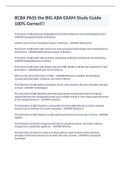
-
BCBA PASS the BIG ABA EXAM Study Guide 100% Correct!!
- Exam (elaborations) • 44 pages • 2023
-
- $12.99
- + learn more
This branch of ABA examines philosophical, theoretical, historical and methodological issues - ANSWER Conceptual Analysis of Behavior Another name for the Conceptual Analysis of behavior - ANSWER Behaviorism This branch of ABA deals with research on basic processes and principles and is mainly done in laboratories - ANSWER Experimental Analysis of Behavior This branch of ABA deals with accessing, monitoring, analyzing, revising and communicating. - ANSWER Applied Behavioral Analysis ...
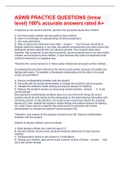
-
ASWB PRACTICE QUESTIONS (lmsw level) 100% accurate answers rated A+
- Exam (elaborations) • 23 pages • 2023
-
Available in package deal
-
- $12.99
- + learn more
ASWB PRACTICE QUESTIONS (lmsw level) 100% accurate answers rated A+ Compared to non abusive parents, parents who physically abuse their children A. Are more easily irritated, and annoyed by their children. B. Have no knowledge or understanding of child development. C. Are more permissive. D. Rely on physical punishment more often. Your Answer should be A. Despite extensive research in the area, few specific characteristic have been found that distinguish abusive parents from non-abusive...
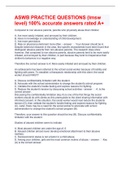
-
ASWB PRACTICE QUESTIONS (lmsw level) 100% accurate answers rated A+
- Exam (elaborations) • 23 pages • 2023
-
Available in package deal
-
- $14.99
- + learn more
ASWB PRACTICE QUESTIONS (lmsw level) 100% accurate answers rated A+ Compared to non abusive parents, parents who physically abuse their children A. Are more easily irritated, and annoyed by their children. B. Have no knowledge or understanding of child development. C. Are more permissive. D. Rely on physical punishment more often. Your Answer should be A. Despite extensive research in the area, few specific characteristic have been found that distinguish abusive parents from non-abusive...

Did you know that on average a seller on Stuvia earns $82 per month selling study resources? Hmm, hint, hint. Discover all about earning on Stuvia


